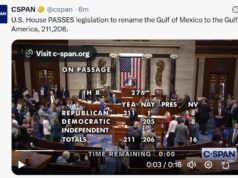It’s possible the Democrats understand well enough how to deal with the Impeachment question. Because the way they are proceeding resembles what they well might choose to do if they’re smart.
But it’s also possible that the Democrats are just spluttering and groping, and possible they will blow it. (Because time and again, over recent years, the Democrats have shrunk from the battle that needs to be fought and – choosing what they have wrongly imagined to be the “safe” course – have brought disaster onto themselves.)
The Democrats have two perfectly legitimate goals for the period between now and the 2020 elections.
- To deal with the manifest lawlessness of Donald Trump, President of the United States, in a way that best protects the nation now and for the future; and
- To wrest power away from today’s morally bankrupt Republican Party in the 2020 elections, by winning both the presidency and control of Congress.
The concern of many Democrats is that these two goals conflict. The problem would arise, it is thought, because
- The conduct of this President, as described in the Mueller Report, really demands his impeachment (and, if possible, his removal), but
- The support among the American people for impeachment is not high enough – at this point – to give assurance that the voters would not punish the Democrats a year and a half from now when they go to the polls.
So it seems reasonable to worry that constitutional duty regarding Trump’s “high crimes and misdemeanors” conflicts with the nation’s need for Democrats to take control of the U.S. government away from a Trump Party that is more consistently destructive than any political party in American history.
But – in the way that they are now proceeding – the Democrats in Congress may have found a way to resolve this difficulty. That solution is implied by a remark made by Lawrence O’Donnell (on 4/22), as the House Judiciary Committee embarks on a process to expose the American people to the picture of Presidential wrong-doing:
“I can’t think of a thing Jerry Nadler would be doing differently tonight if he had announced today that he was starting the impeachment process.”
In other words, the Democrats are conducting a public Investigation to expose the truth while avoiding making the process explicitly about Impeachment. They back-burner the impeachment issue while proceeding in the same way they would if impeachment were their planned destination.
This hedging on the impeachment issue can be prolonged throughout the “fact-finding” process – which will amount to a kind of public trial. (NOTE: It has been observed that Trump’s declaration of complete non-cooperation may push the Democrats into making the inquiry explicitly about Impeachment sooner than they might have wished.)
This hedging might reasonably involve a degree of pretense. For example, House Judiciary Chair Nadler said over the weekend – when asked if Trump’s conduct detailed in the Mueller Report involved “impeachable” offenses – hummed and hawed a bit and then said that yes, “if proved.” As if Mueller’s painstaking investigation did not amount to “proof” aplenty.
The Democrats can pretend to need to check everything out for themselves—interviewing the witnesses and laying out the documents all in public, while the American people get to watch this court-room drama on television.
What’s pretense is that the investigative process is really not so much about “proving” what is already known as it is trying the case in the court of public opinion.
(Two other points:
- Ironically, AG William Barr’s taking it upon himself to use redaction to control what Congress gets to see could help the Democrats by handing them one more reason to delay reaching any conclusion about whether impeachment is called for.
- In addition, the Democrats’ apparent disagreements about impeachment – e.g. Elizabeth Warren putting the issue as a “point of principle,” while Steny Hoyer says that the 2020 election is the means of dealing with Trump – could be a fine way for the Democrats to keep the impeachment issue alive in people’s minds, while avoiding whatever danger there may be in being visibly and officially heading toward Trump’s impeachment.)
So one can imagine this unofficial public trial proceeding, partially masquerading as a truth-gathering inquiry, so that in the process more and more Americans will be helped to see the criminality of Trump as President more and more clearly.
It is not until that process has played out that the Democrats would have to face the question that worries many Democrats now: i.e. whether or not there’s a conflict between their constitutional duty on this lawless President and the need to play their political cards for a successful outcome in the 2020 elections. Which boils down to the question, “How much public support is there for impeachment?”
By that point, the dilemma that worries the Democrats might well have disappeared. Already, the latest poll shows that the release of the Mueller Report has put Trump approval further underwater (a net -18) than it has ever been. It may be that at the end of the “truth-finding” mission, an adequate majority of the “jury” (a.k.a. the American people) will be calling for impeachment.
So the Democrats now can postpone confronting that choice on whether to impeach. Instead, they should be asking this main question:
How can they best present to the American people the evidence of Trump’s wrong-doing, so that there will be maximal support for Congress doing what the Constitution clearly calls for them to do when faced with a President with such flagrant contempt for the rule of law, and maximal political rewards for those who fulfill that responsibility?
And then there is the question: What is the threshold of support for impeachment that would make proceeding to impeach good politics, as well as constitutionally correct?
If the required level is reached, the Democrats confront no dilemma on impeachment. Only if the “trial in the court of public opinion” fails to move the American people to that level do the Democrats have to confront that possible dilemma regarding their two important goals being in conflict.



 Sign up for the Blue Virginia weekly newsletter
Sign up for the Blue Virginia weekly newsletter







